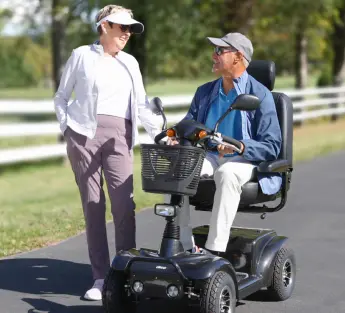Home care requires careful consideration of every aspect of a person's environment, with the choice of bed being a fundamental component. The right bed can significantly enhance the quality of life, offering not just comfort but also meeting the nuanced health and care requirements that come with in-home care. This article explores the essentials of hospital beds, designed to provide support, safety, and convenience. Whether adjusting to a new care regimen or optimizing an existing one, understanding these bed options is essential in crafting a nurturing home care setting.
Adjustable Bed vs. Hospital Bed vs. Homecare Beds
With many bed options to aid in sleep quality and mobility independence, it can be confusing to know which is the right for your needs and situation. Let's review the differences and why someone may want to choose a hospital bed over an adjustable or homecare bed.
Adjustable beds are often used in home environments, where the primary focus is on comfort rather. They usually come with options to adjust the head and foot sections and sometimes include luxurious features like massage or zero-gravity settings.
On the other hand, homecare beds bridge the gap between comfort and medical needs. They are similar in look to hospital beds but are designed for long-term use in a home setting, providing durability and adjustable features necessary for caregiving.
Finally, hospital beds are the most medically advanced option, equipped with features that assist in intensive care, such as higher adjustability, side rails, and electronic controls for both the patient and caregiver's ease.
Each bed type is tailored to its setting, ensuring that users receive the appropriate level of support and functionality.
Types of Hospital Beds
- Offer the highest level of convenience and adjustability
- Features can include remote controls for bed height, head, and foot adjustments
- Ideal for users seeking ease of use and independence
- Provide a mix manual and electric adjustments
- Balances functionality and cost
- Require physical adjustments
- Most economical option
- Ideal for those with minimal adjustment needs
- Choose from bariatric for higher weight to ultra-light and lightweight
- Ideal to help ease mobility and transport within the home care setting
These varieties ensure that regardless of the specific needs or budget constraints, there is a hospital bed option available.
Key Features to Consider
When selecting a hospital bed, several key features should be considered to ensure the choice best fits the user's needs.
- Weight Capacity: Ensures safety and durability.
- Adjustability: Key for comfort; includes bed height and head/foot angles.
- Low to Ground: Important for patients with fall risks.
- Battery Backup: Maintains functionality during power outages.
- Mattress Selection: Critical for patient support and comfort, involving choices in thickness, material, and design tailored to individual medical needs and preferences.
Understanding these features helps in making an informed decision, ensuring the bed selected offers the necessary support and convenience for effective home care.
Choosing the Right Mattress and Accessories
Selecting an appropriate hospital bed mattress is crucial, as it significantly affects a patient's comfort and health. The mattress must align with the bed frame, and its size should precisely match to ensure it securely fits the bed's dimensions. Typically composed of high-density foam, these mattresses are constructed to provide robust support over prolonged periods, aiding in the prevention of pressure sores and accommodating various health conditions. Assessing the right combination of thickness, firmness, and pressure-relieving features is vital and should be tailored to the patient's specific health requirements.
In addition to the mattress and frame, hospital bed accessories are essential for a tailored care environment, each serving a unique function. Fluid-resistant covers are designed to protect the mattress from spills and contaminants, while bed rails provide stability and prevent falls. Overbed tables offer the convenience of a flat surface for meals or reading, and trapeze bars afford users a secure tool to adjust their position and aid in transfers, thereby promoting patient autonomy and enhancing the overall safety and comfort of the care setting.
Conclusion
Selecting the right hospital bed and accompanying amenities is more than a necessity; it's a step towards ensuring quality in-home care. SpinLife's diverse array of hospital beds, mattresses, and accessories offers a breadth of choices to fit specific home care scenarios. We proudly provide the tools needed for effective home care and stand as a partner in the journey toward comfort and independence for those in need of hospital beds.





 Contact Us
Contact Us
 M-F 9am - 6pm ET
M-F 9am - 6pm ET
 Request parts
Request parts Request Service
Request Service

